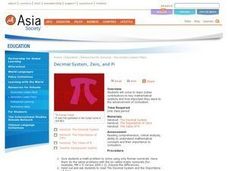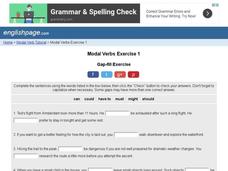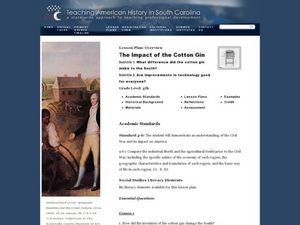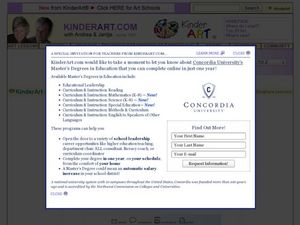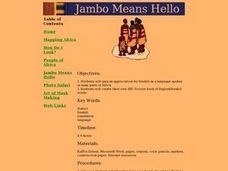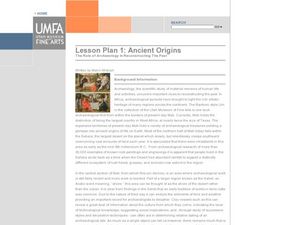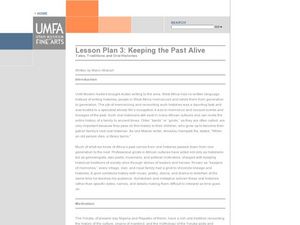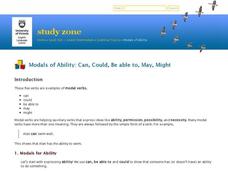Curated OER
A Method of Front-End Arithmetic
Teach the class how to add using front-end addition. They are given a shopping list and use it to practice adding from the largest place value to the smallest. Computational math and shopping, what fun!
Curated OER
Decimal System, Zero, and Pi
Students explore Indian contributions to mathematics. In this mathematics history instructional activity, students examine the decimal system, zero, and pi as contributions from the Indian culture.
Curated OER
History Lesson Plan: The Israeli-Palestinian Conflict
Pupils explore the Israeli-Palestinian conflict. In this Middle Eastern history lesson, students discover the ancient and contemporary history of Palestine in a lecture format. Pupils research primary and secondary sources regarding the...
Curated OER
Israel History: The Big Picture
In this Israel study guide worksheet, students read a brief overview pertaining to the history of Israel from 1900 B.C. to the present and fill in the blanks with the appropriate words. Students also respond to 11 short answer questions...
Curated OER
Famous Firsts Crossword
In this crossword puzzle worksheet, young scholars read the 10 clues about famous firsts for Black history. Students use the words in the word bank to complete the puzzle.
Curated OER
ESL: Modals-Can, Could, Be able to, May, Might
In this ESL modals worksheet, students type in the appropriate word to correctly complete sentences, choosing from: can, could, be able to, may or might, using negatives when necessary.
Curated OER
Modal Verbs Exercise 1
In this online interactive grammar skills worksheet, students answer 20 fill in the blank questions regarding the use of modal verbs. Students may submit their answers to be scored.
Curated OER
Gerunds and Infinitives 17
In this gerund/infinitive worksheet, student fill in blanks in sentences, clicking on a "check" button for feedback on their answers.
Curated OER
The Impact of the Cotton Gin
Fourth graders study Eli Whitney and the cotton gin. In this lesson on the cotton gin, 4th graders use primary and secondary sources to gather information about Eli Whitney, the cotton gin that he invented and how it changed the south.
Curated OER
Khamsa Good Luck Hands
Students study the use of symbols in cultural art and create a collage of their hand prints. In this symbolism and art lesson, students learn about the use of symbolism in cultural art by studying the Moroccan art design called a Khamsa....
Curated OER
Word Play
Students examine the Japanese folktale, Monkeys Grasp for the Moon. In this multicultural literature lesson, students discuss the theme of the folktale. Students choose animal folktales from other Asian cultures for comparison.
Curated OER
Word Play
Students explore the work of Xu Bing. In this visual arts lesson, students examine the art piece "Monkeys Grasp for the Moon" and compare it to the Buddhist folktale on which it is based. Students create animated flip books based on the...
Curated OER
Terrorism: How Have Other Countries Handled It? How Should We?
Learners explore the questions of security. In this terrorism lesson, students listen to their instructor present a lecture regarding the details of methods countries have used to combat terrorism. Learners respond to discussion...
Curated OER
Making a Brand for Ourselves the "Cowboy" Way
Students define cowboys and learn about their roles on rangelands. In this rangeland lesson, students define cowboys and cowgirls and complete a KWL chart. Students read Cattle Kids and Til the Cows Come Home. Students visit the Diamond...
Curated OER
Who Were the Ottomans?
Students explore the Ottoman Empire. In this Ottoman Empire instructional activity, students analyze images of the empire as they take a gallery walk. Students compare and contrast the Ottoman Empire to the other empires in the region of...
Curated OER
A Passport to Asia
Students explore Asia. In this geography skills lesson, students design travel brochures that market Asia by highlighting its location, population, capital, landforms, famous places, and food.
Curated OER
Discovering Swahili
Students investigate the African language of Swahili by translating vocabulary words. In this foreign language lesson, students write 26 English words that define Africa and utilize the Internet to translate them into Swahili. Students...
Curated OER
Human Rights Violations
Students explore how human rights are different in each part of the world. For this freedome lesson, students define human rights, research how human rights in one country ultimately affect other countries, and share their findings...
Curated OER
What Is the History of the Consumption of Rice?
Sixth graders research the history of rice consumption. In this rice consumption lesson plan, 6th graders read a study guide and answer comprehension questions about two rice dishes and rice cultivation.
Curated OER
Ancient Origins: The Role of Archaeology in Reconstructing the Past
Students read information about the ancient origins of art and archaeology with a focus on the Malian culture. In this art origins lesson, students read background information for the topic and compare ancient and contemporary objects....
Curated OER
Keeping the Past Alive
Students read about the oral histories of West Africa and complete related activities. In this oral histories lesson, students read about the importance of oral customs in African cultures. Students interview a family member about oral...
Curated OER
WWJD: What Would Jimmy Do?
Young scholars interpret historical evidence presented in primary and secondary resources. In this 1973 oil crisis lesson, students research details regarding President Carter's policies regarding the oil crisis that produced a scarcity...
Curated OER
Archaeology For Kids Quiz 85
In this archaeology for kids quiz 85 worksheet, student interactively answer 12 multiple choice questions about honoring the dead in ancient cultures, as part of an online magazine.
Curated OER
Levels of Ability
In this levels of ability worksheet, students fill in the blanks to sentences with the correct forms of can, could, be able to, may, or might. Students complete 13 multiple choice questions.
Other popular searches
- Arabic Poetry
- Arabic Calligraphy
- Arabic Influence
- Multicultural Music Arabic
- Arabic Numbers
- Arabic Language
- Arabic Numerals
- Arabic Architecture
- Arabic Influence in Spain
- Arabic Foods
- Arabic Poetry for Teachers
- Arabic Poetry for Students



